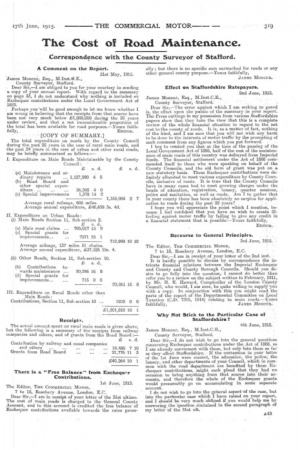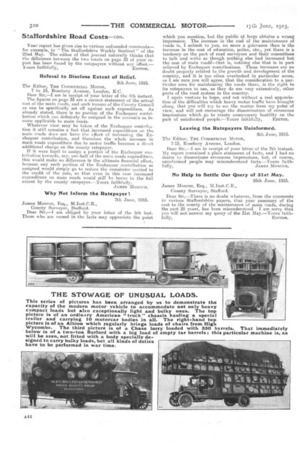The Cost of Road Maintenance.
Page 15

Page 16

If you've noticed an error in this article please click here to report it so we can fix it.
Correspondence with the County Surveyor of Stafford,
A Comment on the Report.
31st May, 1915.
James Moncur, Esq., M.Inist.g.E., County Surveyor, Stafford.
. Dear Sir,—I.am obliged to you for your courtesy in sending a copy of your annual report. With regard. to the summary on page 33, I do not understand why nothing is included ex Exchequer contributions under the Local Government Act of 1883.
Perhaps you will be good enough to let me know whether I
i
am wrong n believing that the receipts from that source have been not very. much below £1,000,000 during the 25 years under review, and that a not inconsiderable proportion of the total has. been available for road purposes.—Yours faith fully, . Enrron.
• [COPY OF SUMMARY.] The total expenditure on roads by the County Council during the,past 25 years in the case of rural main roads, and the past 24 years in the case of urban and other rural roads, may be briefly summarized as follows:— I. Expenditure on Main Roads Maintainable by the County
The Editor, THE COMMERCIAL MOTOR, let June, 1915. 7 to 15, Rosebery Avenue, London, RC.
The cost of main roads is charged to the General County Account, and to this account is credited the free balance of Dear Sin—I am in receipt of your letter of the 31st
Exchequer contributions available towards the rates gener ally ; but there is no specific sum earmarked for roads or any other general county purpose.--Yours faithfully,
Dear Sir,—The error against which. I am seeking to guard is, the effect upon the public of the summary in your report. The Press cuttings in my possession from various Staffordshire papers show that they take the view that this is a complete review of the whole financial situation in regard to the -net cost to the county of roads. It is, as a matter of fact, nothing of the kind, and I am sure that you will not wish any harm to be done to the interests of motor traffic by the prompting of such comment from any figures which you put forward.
I beg to remind you that at the time of the passing of the Local Government Act of 1888, half of the cost of the maintenance Of main roads of this country was defrayed from Imperial funds. The financial settlement under the Act of 1888 commended itself to those who were speaking on behalf of the County Councils, and the old form of grant was put on a new statutory basis. These Exchequer contributions were definitely allocated to meet various expenditure by County Councils, inclusive of roads. It is true that the County Councils have in many cases had to meet growing charges under the heads of education, registration, lunacy, quarter sessions, police and Sanitation, as well as roads. Am I to gather that in your county there has been absolutely no surplus for application to roads during the past 25 years?
I hope you will appreciate the point which I mention, because I feel confident that you have –no wish to create illfeeling against motor traffic by failing to give any credit in a financial statement that is possible;1=Yours faithfully,
Recourse to General Principles.
rd June, 1915. The Editor, THE COMMERCIAL MoTon,
7 to 15, Rosebery Avenue, London, E.C.
Dear Sir,—I am in receipt of your letter of the 2nd inst. It is hardly possible to discuss by correspondence the intricate financial relations between the Imperial Exchequer and County and County Borongh Councils. Should you desire to go fully into the question, I cannot do better than refer you to a review on the subject written in February, 1911, by Mr. IL E. Harvard, Comptroller of the London County Council, who would, I am sure, be quite willing to supply :you with a copy. In conjunction with this you might read thc parts of the report of the Departmental Committee on Local Taxation (C.D. 7315, 1914) relating to main roads.—Koura faithfully, JAMES MONCUR: Why Not Stick to the Particular Case of Staffordshire?
4th June, 1915.. James Moncur, Esq., M.Inst.C.E.,
County Surveyor, Stafford; Dear Sir,—I do not wish to go into the general questions concerning Exchequer contributions under the Act of 1888, as I am already conversant with these, but only into them so far as they affectStaffordshire. If the cofrtention in your letter of thc let June were correct, the education, the police, the lunacy, and other departments of your Council, which in common with the road department are benefited by these Exchequer contributions, might each plead that they had no occasion to bring anything from that source into their accounts, and therefore the whole f the Exchequer grants would presumably go on accumulating in some separate account.
I do not wish to go into the general asp-set of the case, but into the particular ease which I have raised on your report, and I should be very much obliged if you would help me by answering the question contained in the second paragraph of my letter of the 31st ult.
Your report has given rise to various unfounded comments— for example, in " The Staffordshire Weekly Sentinel" of the 22nd May. The editor of that journal naturally thinks that the difference between the two totals on page 33 of your report has been foaled by the ratepayers without any offset.—
Yours faithfully, EDITOR.
Refusal to Disclose Extent of Relief.
5th June, 1915. The Editor, THE COMMERCIAL MOTOR,
7 to 15, Rosebery Avenue, London, E.C.
Dear Sir;—I am in receipt of your letter of the 4th instant. The figures on page 33 are a correct statement of the actual cost of the main roads, and such income of the County Council as can be specifically set off against such expenditure. As already stated, there is no portion of the Exchequer contribution which can definitely be assigned in the accounts as income applicable to main roads.
Whatever view may be taken of the Exchequer contribu• tion it still remains a fact that increased expenditure on the main roads does not have the effect of increasing the Exchequer contribution, and therefore the whole increase in main roads expenditure due to motor traffic becomes a direct, additional charge on the county ratepayer.
If it were legal to assign a portion of the Exchequer contribution towards, say, one-half of the main roads expenditure, this would make no difference in the ultimate financial effect, because any such portion of the Exchequer contribution so assigned would simply go to reduce the remainder carried to the credit of the rate, so that even in this case increased expenditure on main roads would still be borne to the full extent by the county ratepayer.—Yours faithfully,
Why Not Inform the Ratepayer?
7th June, 1915. JA M ES Mo exult.
Dear Sir,—I am obliged by your letter of the 5th inst. Those who are versed in the facts may appreciate the point James Moncur, Esq., M.Inst.C.E., County Surveyor, Stafford. .
which you mention, but the public at large obtains a wrong impression. The increase in the cost of the maintenance of roads is, I submit to you, no more a grievance than is the increase in the cost of education, police, etc., yet there is A tendency on the part of road surveyors and their committees to talk and write as though nothing else had increased but the cost of main roadS—that is, -nothing else that is in part relieved by Exchequer contributions. These increases are no doubt properly related to the growth and development of the country, and it is too often overlooked in particular areas, as I am sure you will agree, that the consideration to a particular area for maintaining the roads there, is the right to its ratepayers to use, as they do use very extensively, other parts of the road system in the country.
I again venture to hope, and not without a real appeeciation of the difficulties which heavy motor traffic have brought along, that you will try to see the matter from my point of view, and will not encourage the dissemination of erroneous impressions which go to create unnecessary hostility on the part of uninformed people.—Yours faithfully, EDITOR.
Leaving the Ratepayers Uninformed.
9th June, 1915.
The Editor, THE COMMERCIAL MOTOR, 7-15, Rosebery Avenue, London.
Dear Sir,—I am in receipt of your letter of the 7th instant. My report contained a plain statement of facts, and I had no desire to disseminate erroneous impressions, but, of course, uninformed people may misunderstand facts.----Yours faith fully, JAMES MONCUR.
No Help to Settle Our Query of 31st May.
10th June, 1915.
James Moncur, Esq., "M.Inst.C.E,, County Surveyor, Stafford.
Dear Sir,—There is no doubt whatever, from the comments in various Staffordshire papers, that your summary of the cost to the county of the maintenance of main roads, during the past 25 years, has been misunderstood. I am sorry that you will not answer my query of the 31st May.—Yours faith EDITOR.






















